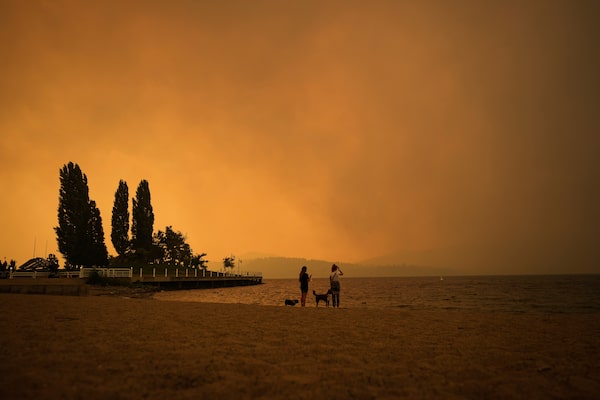
Smoke from the McDougall Creek wildfire fills the air and nearly blocks out the sun as people take in the view of Okanagan Lake from Tugboat Beach, in Kelowna, B.C. on Aug. 18.DARRYL DYCK/The Associated Press
Marvin Shaffer is a retired consulting economist and an adjunct professor at Simon Fraser University’s School of Public Policy. John Richards is a professor emeritus at Simon Fraser University’s School of Public Policy. Curtis Eaton is a professor emeritus of economics at the University of Calgary.
British Columbia now knows it has a climate-change problem. In its latest budget, the provincial government recognized that B.C. has seen “an increase in extreme, weather-related disasters, including wildfires, the 2021 summer heat dome and the November, 2021, atmospheric river and subsequent flooding.” Yet in the spring of 2023, the province allocated only $200-million for managing wildfires. When its first-quarter report came out in September, the finance ministry acknowledged the total cost of managing B.C.’s summer fires to be almost $1-billion – nearly five times what the province had allocated.
To pay for wildfire management, the province had to increase its projected deficit by an extra $760-million. And that’s just wildfires: The province has not even begun adequate budgeting for other severe climate events, nor has it begun to systematically fund the investments called for by commissions of inquiry, government agencies, municipalities, Indigenous communities and others to minimize future damages.
We face two carbon-related problems. We need to reduce future carbon emissions in order to slow the potentially catastrophic warming of the planet, and we need to adapt to the climate change events already upon us – events that will almost certainly increase in frequency and severity in the years ahead. A carbon tax that pays for climate-change adaptation measures would reduce the need to squeeze social programs or increase debt, and continue to reduce future emissions.
Canada’s carbon tax, as the argument goes, takes aim at the first problem; by increasing the cost of using fossil fuels, it provides an incentive to find nonfossil alternatives. It is a legitimate rationale. However, in many cases, substituting alternatives is costly and, increasingly, both Ottawa and the provinces are creating exemptions – for example, by eliminating the carbon tax on heating residences reliant on oil or natural gas. The implicit rationale behind such exemptions is that reducing world emissions requires concerted international co-ordination; Canada’s exemptions provide a tangible benefit by reducing consumers’ costs, and Canada’s imposition of the tax has only a negligible impact on world emissions.
In 2008, British Columbia introduced the first significant carbon tax in North America. To improve public acceptance, B.C.’s tax was designed as “revenue-neutral” – that is, the revenue raised by the tax would be distributed to British Columbians, through targeted credits for low-income families and a variety of tax credits for all. In the 2023-2024 fiscal year, the province projects carbon tax revenue to be $2.8-billion. Ottawa and other provinces have all designed their carbon taxes in similar, revenue-neutral ways.
But things have changed since the 2000s, when adverse climate effects were minor; today, governments need additional revenue urgently owing to climate effects. At present, B.C. relies on general government revenue to pay for managing forest fires, repairing dikes and other infrastructure destroyed by “atmospheric rivers.” Why not dedicate the $2.8-billion to present-day climate-change costs that B.C. citizens must pay, one way or another? If we dedicate carbon-tax revenues to financing adaptation, we would continue to make a small contribution to future emission reductions. We’d also address the financing of immediate problems without increasing government deficits or reducing valuable public services. We can continue to assist lower-income families, in the same way as targeted tax credits offset the impact of consumption taxes for many.
The need to budget for climate-change costs is increasingly apparent. There is a good case to break from the original political strategy of revenue-neutrality and to dedicate carbon-tax revenue to cover at least some of the needed expenditures occasioned by climate change. Indeed, committing carbon tax revenues to adaptation expenditures explicitly introduces the “polluter-pay” principle – the idea that those who produce emissions should bear the costs of managing their effects.
Some people have trouble accepting the need for Canada to introduce price signals to reduce future world emissions. But almost everyone understands that investments are necessary to minimize climate-induced damages here and now.